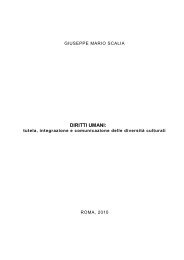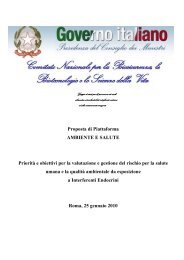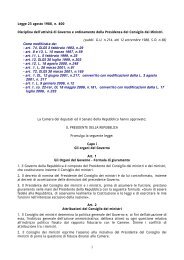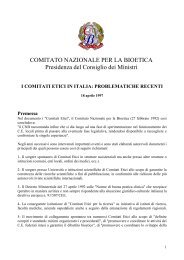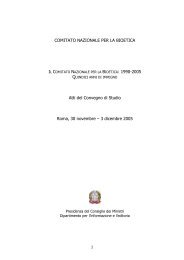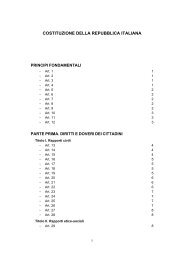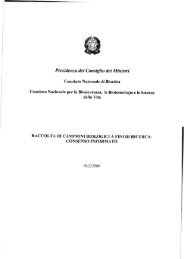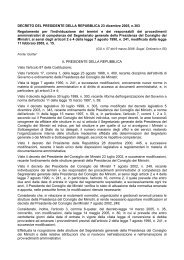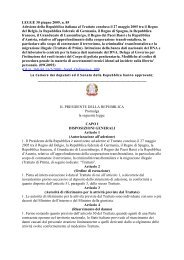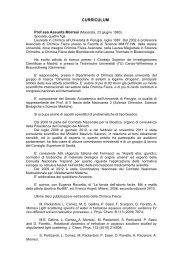President
President
President
You also want an ePaper? Increase the reach of your titles
YUMPU automatically turns print PDFs into web optimized ePapers that Google loves.
The moment that education in bioethics is put forward as a necessary task,<br />
we assume that there is a positive response to the first question that one<br />
should ask: why educate in bioethics?<br />
Education in bioethics, as we have attempted to highlight above, is an<br />
integral part of the citizenship education of the new generations, so much so<br />
that we can speak of “bioethical citizenship” or education of the future citizen to<br />
make conscious choices in the context of bioethics, biolaw and biopolitics. The<br />
right to information, the essential core of democratic life, finds, in bioethical<br />
issues, an extremely important application. To take part in the open, free and<br />
equal debate that characterizes the "good life" of any democracy, concerning<br />
the choices that affect the lives of everyone, such as the choices related to<br />
important bioethical issues (from the environment to the care of human life),<br />
however, information, despite its playing a primary role, is not the only<br />
requirement, education is also necessary.<br />
Education in bioethics is therefore characterized as including within it,<br />
information on bioethical issues as well as the teaching of bioethics, as it<br />
includes knowledge of bioethical issues, but it goes beyond this, and educates<br />
in “bioethical skills”, that is, formation of the capacity to formulate moral<br />
judgements, arguing and discussing them with others.<br />
This complex and difficult education, cannot be left to chance or assigned to<br />
old and new messages of the media, trusting that alongwith the large amount of<br />
provided information there takes over a spontaneous ability as to how to<br />
navigate through complex bioethical issues. The risk that is run goes from the<br />
specific context of education in bioethics to the wider one of citizenship<br />
education, jeopardizing a fundamental right of the future citizen: to be educated<br />
to understand the issues of the polis and therefore able to decide freely and<br />
consciously.<br />
From the close connection between education in bioethics and citizenship<br />
education emerge two fundamental principles of an education in bioethics: the<br />
principle of autonomy and that of justice. The principle of autonomy indicates<br />
the direction that education in bioethics needs to take, namely the formation of<br />
rational, autonomous judgement, free from ideological pressure, so as to<br />
guarantee agreement or disagreement which, in interpersonal situations or<br />
participation in collective choices, is truly aware and responsible. The principle<br />
of justice oversees the basic conditions of education in bioethics this requires<br />
commitment to the highest social effort so that all future citizens will be ensured<br />
a basic education of equal quality, an essential guarantee for their actual<br />
participation in the bioethical debate as interlocutors with equal dignity.<br />
If this premise, as to why to educate in bioethics, is accepted, the answer to<br />
another question is implicit: who to educate in bioethics? It is clear that the<br />
recipients of this education will not only be the professionals in certain fields<br />
(biologists, biotechnologists, doctors or philosophers, jurists etc.), but all<br />
citizens or future citizens. This leads to broadening the scope of education in<br />
bioethics beyond that of universities- where the new discipline has long since<br />
found a place in our country, being present as an autonomous branch of<br />
teaching within the sectors of different scientific disciplines 374 , both in scientific<br />
374 Bioethics is included in the sectors of: Forensic Medicine (MED/43), History of Medicine<br />
(MED/02) Moral Philosophy (M-FIL/03), and in the indication of Bioethics and Human Rights in<br />
the field of Philosophy of Law (IUS/20) and Biolaw, in the sector of Private Law (IUS/03).<br />
284



